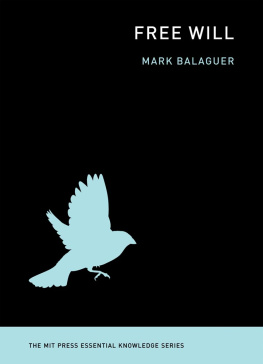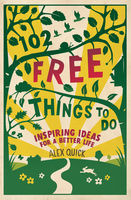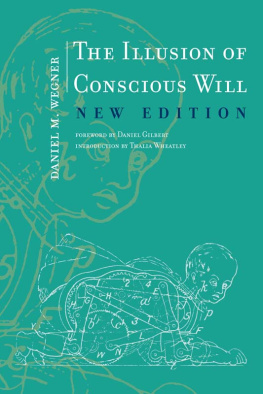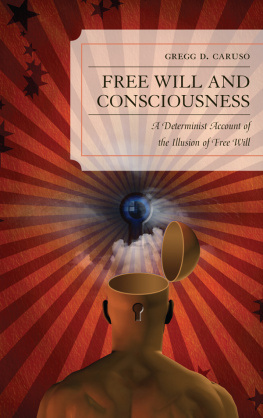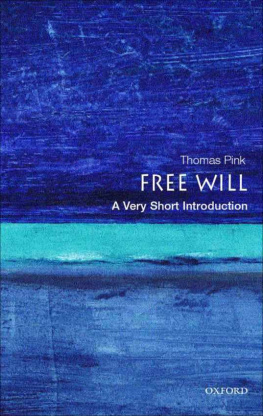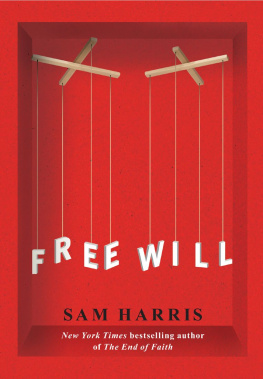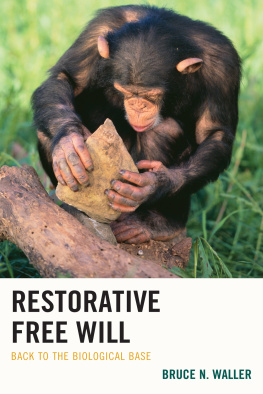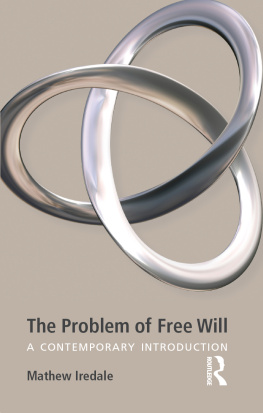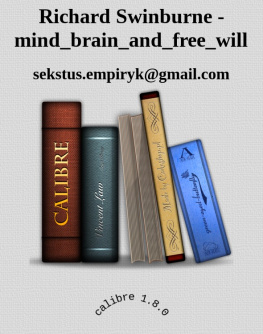Free Will
The MIT Press Essential Knowledge Series
Computing: A Concise History, Paul Ceruzzi
Crowdsourcing, Daren C. Brabham
Free Will, Mark Balaguer
Information and the Modern Corporation, James Cortada
Intellectual Property Strategy, John Palfrey
Memes in Digital Culture, Limor Shifman
Open Access, Peter Suber
Paradox, Margaret Cuonzo
Waves, Fred Raichlen
Free Will
Mark Balaguer
The MIT Press | Cambridge, Massachusetts | London, England
2014 Massachusetts Institute of Technology
All rights reserved. No part of this book may be reproduced in any form by any electronic or mechanical means (including photocopying, recording, or information storage and retrieval) without permission in writing from the publisher.
Library of Congress Cataloging-in-Publication Data
Balaguer, Mark.
Free will / Mark Balaguer.
p. cm.
Includes bibliographical references and index.
ISBN 978-0-262-52579-4 (pbk. : alk. paper)
ISBN 978-0-262-32146-4 (retail e-book)
1. Free will and determinism. I. Title.
BJ1460.B35 2014
123.5dc23
2013028479
This book is dedicated to Ellen Balaguer and Paul Balaguer, my sister and brother, for always being there for me since before I can remember.
Series Foreword
The MIT Press Essential Knowledge series offers accessible, concise, beautifully produced pocket-size books on topics of current interest. Written by leading thinkers, the books in this series deliver expert overviews of subjects that range from the cultural and the historical to the scientific and the technical.
In todays era of instant information gratification, we have ready access to opinions, rationalizations, and superficial descriptions. Much harder to come by is the foundational knowledge that informs a principled understanding of the world. Essential Knowledge books fill that need. Synthesizing specialized subject matter for nonspecialists and engaging critical topics through fundamentals, each of these compact volumes offers readers a point of access to complex ideas.
Bruce Tidor
Professor of Biological Engineering and Computer Science
Massachusetts Institute of Technology
Acknowledgments
I would like to thank the following people (mostly family members) for offering helpful feedback on earlier drafts of this book: Ellen Balaguer, Marcella Balaguer, Melchor Balaguer, Paul Balaguer, Judy Feldmann, Michael McKenna, and two anonymous referees.
Introduction
In the last few years, several people have argued that science has shown us that human beings dont have free will. People like Daniel Wegner (a Harvard psychologist) and Sam Harris (a neuroscientist and the author of various popular philosophy books) claim that certain scientific findings reveal that free will is an illusion.
If this were true, it would be less than splendid. And it would be surprising, too, because it really seems like we have free will. It seems that what we do from moment to moment is determined by conscious decisions that we freely make. Suppose, for instance, that Im lying on my couch watching TV, and I suddenly decide to get up and go for a walk. It seems that the reason that I got up and went for a walk is that I made a conscious decision to do so. I could have kept watching TV, or I could have done something completely different. Hell, I could have painted myself green and pretended I was the Incredible Hulk, engaged in a battle to the death with an evil troupe of Lithuanian trapeze artists. But I didnt; I went for a walk. And when I did that, I exercised my free will. Or so it seems to us. But if people like Wegner and Harris are right, then this feeling of freedom that we all have is an illusion. On their view, we dont really have free will. In other words, we dont have any real choice about what we do. Rather, on their view, everything we do is completely caused by things that are totally out of our control. And, again, according to these people, there is scientific evidence that supports the claim that we dont have free will.
I dont trust these people. Its not that I dont trust science. On the contrary, I really trust science. I think its the best way we have of acquiring knowledge about the world. I just dont trust people. And I really dont trust people who tell me that science has shown that some crazy claim is true. Now, dont get me wrongIm fully aware that science has already shown us that lots of crazy claims are true. But for every case where science has legitimately established the truth of some crazy-sounding result, there are a thousand cases where people erroneously claim that science has established a crazy-sounding result. So the moral here is this: Just because someone with a PhD and a lab coat tells you that science has established some nutty conclusion doesnt mean its really true. Of course, it doesnt mean its false either. My claim is simply that we have to check it out for ourselves.
So Im completely open to the idea that science could establish that we dont have free will. After all, our decision-making processes are brain processes. In particular, theyre neural processes, and neural processes are obviously in the domain of scientific investigation. Thats just what neuroscience doesit studies neural processes. So its a real possibility that neuroscientists could discover that we dont have free will. Im just not sure that they have discovered this. So I want to look for myself and see if theyre right.
Thats what this book is going to be about. Im going to discuss and evaluate the various arguments and scientific experiments that people have put forward in support of the claim that human beings dont have free will. By the end of the book, well be able to answer the question of whether the various arguments are any good; in other words, well be able to say whether we really do have good reason to give up our belief in free will.
Before going any further, I want to bring out an issue that will be relevant to our discussion. Broadly speaking, we can endorse two different views about the nature of human beings. These two views can be summarized as follows:
The spiritual, religious view of humans Every person has an immortal soul, or a nonphysical spirit, thats distinct from the physical body and that somehow drives the body, or tells the body what to do. For instance, if youre thirsty and you consciously decide to go into the kitchen to get a glass of water, then its your soul that makes this conscious decision and causes your body to get up and start walking.
The materialistic, scientific view of humans There is no more to a human being than his or her physical body. There is no nonphysical soul in addition to the body. So everything about you that makes you who you are can be found in your brain. Your beliefs and desires, your hopes and fears, your memories, your feelings of love and hatethese are all in your brain, coded by neural pathways. And if we want to know why you got up and walked into the kitchen, we just have to look at your brain. Theres nowhere else to look, because you dont have a nonphysical soul. Your thirstiness was a physical thing, neurally coded in your brain. Moreover, your conscious decision to go get some water was also physicalit was a physical, neural event that occurred in your brain. And this neural event caused your muscles to move, and so on and so forth.
The debate between these two views is obviously very heated and controversial in its own right, and I am not going to try to settle this debate here. But the difference between these two views of human beings is important to our topic for a few reasons. The first point to note is that the scientific enemies of free willpeople like Wegner and Harris, who think that science has shown that we dont have free willgenerally assume something like a materialistic, scientific view of humans.
Next page
